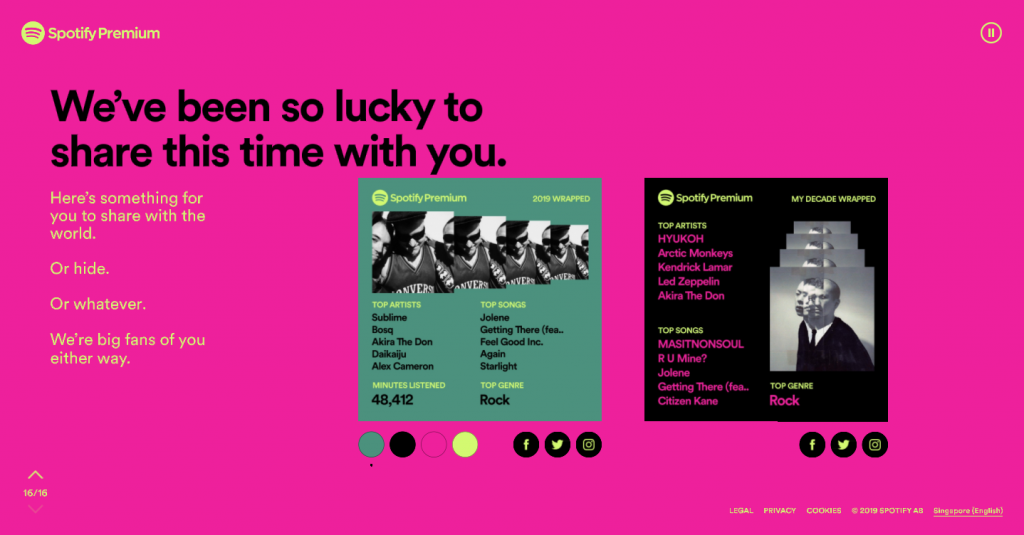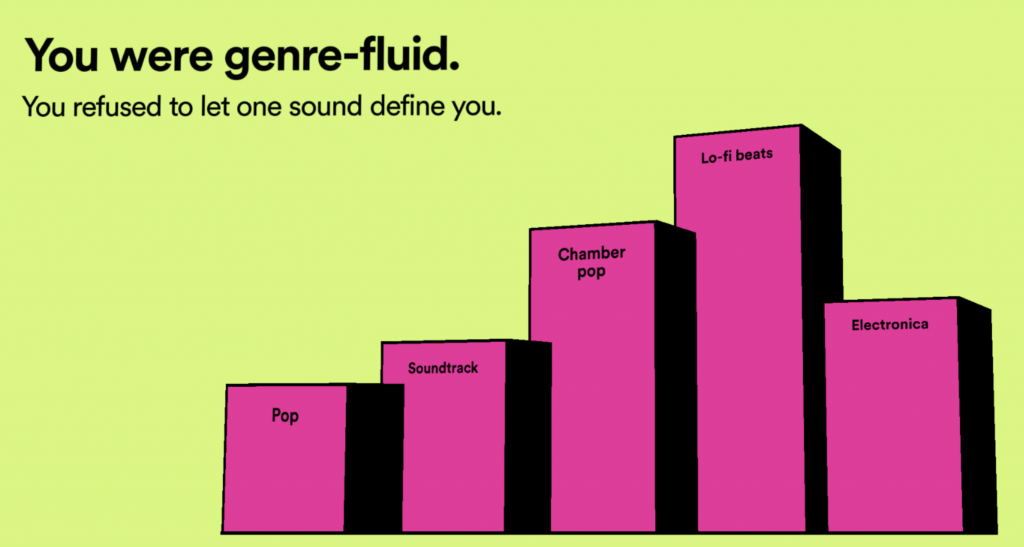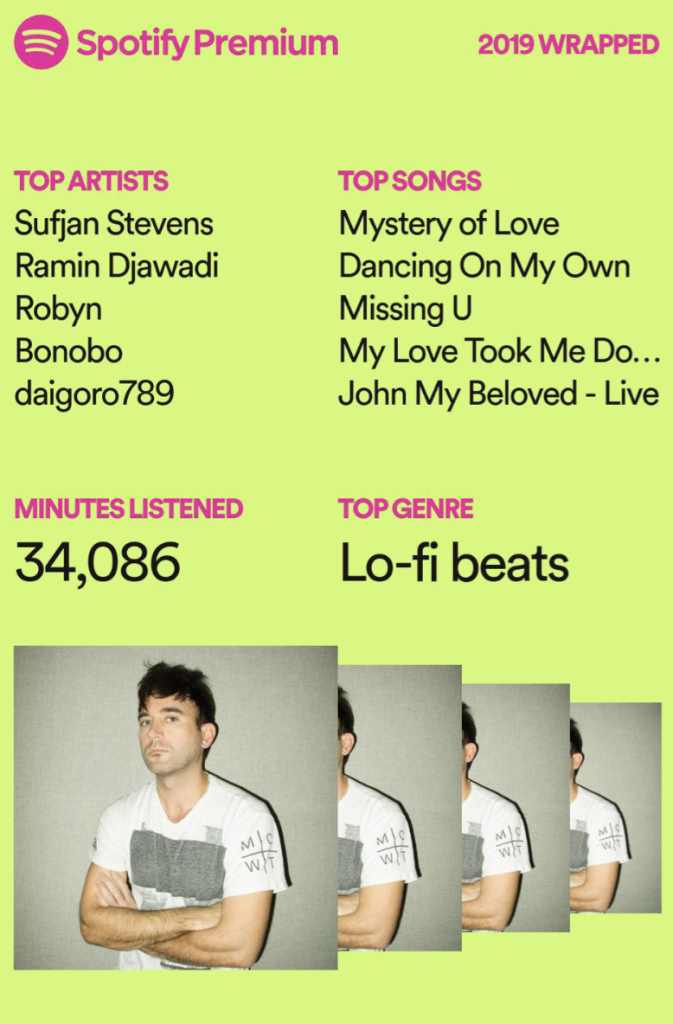
Top image credit: Composite image from Spotify, The Guardian, and @manster_mash on Twitter.
Unless you’re abstaining from social media, in recent weeks you’d have seen neon pink and green graphics with lists of Top Artists and Songs splashed across Twitter, Instagram, and Facebook. I’m talking, of course, about Spotify Wrapped, which is fast becoming a year-end tradition as anticipated as the annual defrosting of Mariah Carey.
Even though Spotify couches our Spotify Wrapped results in ambivalence—“Here’s something for you to share with the world. Or hide. Or whatever.”—it’s mere marketing rhetoric. Like Instagram personalities who cultivate an air of nonchalance but whose existence depends on attention, Spotify wants us to share our results.

Robert Prey, a media-studies professor, is quoted by The Atlantic as saying that “the average music listener often uses music as a sort of aural wallpaper.” But that’s not how our relationship with music functions today. We don’t listen to music just because we appreciate an artist’s voice or the melody of their songs. We listen to music also because we consciously identify with the values an artist and their songs embody, such as a rejection of the mainstream (think Billie Eilish) or a championing of certain demographics (like Beyoncé).
Music, then, is more than a reflection of our sonic inclinations. It forms an integral part of our personality and identity. Admit it: at a first date, you’ve made snap judgments of your partner when you looked through their Spotify playlists; if their most-played artist synchronises with yours, you know that you’ve found your soulmate. In other words, our listening habits—however arbitrary a criterion that is—are seen as a shorthand for the type of person we are.

This isn’t an exaggeration: feeling especially generous and festive one evening at work, I listened to each of my colleague’s top artists and felt like I learnt a bit more about them through that process. The prim colleague who never swears listens most to a song that goes: I fuck yo bitch for the irony / I’ll send Meechy at yo hoe if yo bitch keep eyeing me … Suck a nigga dick or somethin’ (when I ask her why on earth that’s her favourite song, she replies, “I DO NOT KNOW EITHER BUT IT IS TERRIBLE”); the top artist of the ang moh who constantly listens to Led Zeppelin in the office is actually HYUKOH, a Korean indie rock band.
I admit that prior to this, I’d committed the sin of stereotyping my colleagues, but Spotify Wrapped, despite being at its heart a deviously engineered marketing campaign, helped me to correct some of these distortions and reminded me that all of us have facets that we alternately hide and show in different scenarios.
Only the music we listen to knows us entirely.

A few years back, when I was figuring out what I wanted from a relationship, confusion and grief gripped my brain so tightly I couldn’t articulate my thoughts. I stayed an incoherent slug until I surrounded myself with songs that seemed to speak for me what I could not.
This is Jeff Buckley’s Lover, You Should’ve Come Over:
Too young to hold on
And too old to just break free and run
Sometimes a man gets carried away,
When he feels like he should be having his fun
Much too blind to see the damage he’s done
Sometimes a man must awake to find that, really,
He has no one.
Listening to Jeff Buckley’s desperate admission, or Conor Oberst’s voice struggle not to break into ragged shards in Bright Eyes’s Lover I Don’t Have To Love (I want a lover I don’t have to love / I want a boy who’s so drunk he doesn’t talk), I began to understand myself.
Compiled into a playlist I entitled </3 (words truly eluded me then), these songs formed a constant soundtrack to my life regardless of where I was: on the train to school, in the arts canteen having my cai fan (alone), shopping for groceries at NTUC.
I lost myself in these songs, but, at the same time, they helped me find myself.
Thus, I was hardly surprised when Bright Eyes and Jeff Buckley were the stars of my Spotify Wrapped that year. Even though by December I had regained some semblance of humanity and had extricated myself from the train wreck for which I was responsible, Spotify Wrapped reminded me that before I could start the next year afresh, I needed to look into my heart and recognise how ugly it was.
I think it worked.
Both songs didn’t make it to my Spotify Wrapped in 2019. Instead, my top song this year features Sufjan Stevens crooning against the backdrop of his ukulele: Oh, will wonders ever cease? / Blessed be the mystery of love.
Despite my incorrigible inability to confront my own emotions and take stock of my life, that’s how I know that 2019 isn’t all bad, and that I should be grateful for the year.
I’d be remiss to end my article on Spotify Wrapped without sharing mine, so here it is:







